- Home
- Leslie Meier
Halloween Party Murder Page 3
Halloween Party Murder Read online
Page 3
“I wouldn’t put it past some. Teen boys, for example, might try to get a rise out of you just to break the illusion.”
“I’m pretty sure Kevin can keep me safe,” said Heather.
“One thing I can tell you,” said Sue, tucking a stray lock of midnight-black hair behind one ear with her perfectly manicured hand, “is that posing as Ophelia didn’t work out very well for Elizabeth Siddall, the model. Millais did have her in a bathtub of water, which he tried to keep warm with oil lamps, but one of the lamps went out, and she caught a chill and was seriously ill for months.”
“Really?” asked Heather, sounding doubtful.
“It’s true,” said Sue, responding to her friends’ skeptical expressions.
“How on earth do you know this?” asked Lucy.
“I took art history in college, and the professor told us all about it. He really despised the pre-Raphaelites, of which John Everett Millais was one. He said it was a sad and pathetic attempt to idealize the past when the art world was moving forward into exciting new ways of seeing, like impressionism, and painting speeding trains, trying to capture movement and light, and, well,” she grinned naughtily, “that professor made a big impression on me.” She took the teapot over to the stove and added some hot water. She was smiling at the memory when she apologized, saying, “I’m sorry. I got carried away down Memory Lane.”
“Not at all, that’s very interesting,” said Heather. “But I won’t be chilly. No real water.” She smiled. “And I’ll wear my long johns.”
“Actually, I like this idea of yours,” said Pam. “We could reference all sorts of classics. Hamlet and poor Yorick, along with the witches.”
“The witches were in Macbeth,” said Rosie.
Pam was not about to be put off. “Well, just Hamlet and Yorick’s skull then, in a graveyard. And how about Dr. Jekyll and Mr. Hyde? Maybe with a mirror and a strobe sort of light that flicks from one to the other? Wouldn’t that be cool?” She paused momentarily. “Oh, and what about Van Gogh? Slicing his ear off!”
“Maybe we should leave the choice of scenes to Ty and Rosie,” suggested Rachel.
“Right.” Pam took a deep breath. “I was letting my imagination run away with me.”
“All good ideas,” said Heather, politely.
“What else do you have in mind, apart from Ophelia?” asked Lucy. “Is there anything for us?”
Heather smiled, one of those “butter wouldn’t melt in her mouth” smiles. “Actually, we do. Don’t we, Rosie?”
Rosie was grinning broadly and could hardly contain her excitement. “It’s terrific!”
“What is it?” asked Pam, eagerly.
“Well, remember, you don’t have to do it,” said Heather. “It’s just a suggestion.”
Sue returned to the table with the fresh pot of tea. “We’re all dying to hear,” she said, setting it down. “Tell us while it steeps.”
“Okay.” Heather bit her lip. “It was Ty’s idea, really. He thought we could have a guillotine, and the blade would come down and a head would roll.” Her eyes had grown quite bright, and her face became animated as she went on to describe the special effects. “He can create the illusion of blood with lights, and he’d add the sound of the blade whooshing and thumping down.”
“It would be like that scene from A Tale of Two Cities, you know, the book by Dickens,” said Rosie.
“’Tis a far, far better thing that I do than I have ever done,’” quoted Lucy, with a dramatic flourish. “I guess I could be that guy.”
“Oh, no,” said Heather, hastily. “No. We thought you’d make a perfect Madame Defarge, Lucy.”
Lucy felt rather deflated. “Madame Defarge?”
“Yes,” continued Heather brightly. “And you could all be tricoteuses, the women who knitted and chortled gleefully while the guillotine did its grisly work in the French Revolution.”
“Well, that would certainly be interesting,” said Sue, rather coolly. “More tea?”
Nobody seemed interested in tea. The mood in the room had suddenly changed; the enthusiasm was gone. Silent glances were exchanged, and suddenly, as if with one accord, they were all beginning to gather up their things and preparing to leave. Thank-yous were offered, goodbyes were said, and the women quickly departed.
Rosie and Heather were standing together on the porch when Lucy went outside, but when she tried to say goodbye, they didn’t respond, but ignored her and continued their conversation. Walking down the brick path to her car, Lucy had the unnerving sensation that she was becoming invisible. And when Rosie and Heather actually deigned to acknowledge her, she fumed, they thought she would make a perfect Madame Defarge. Settling herself behind the steering wheel, she came to the unwelcome conclusion that it wasn’t a compliment.
Chapter Three
Lucy was still fretting about Heather’s assertion that she would make a perfect Madame Defarge when she went, along with Bill, on Sunday afternoon to work on setting up the haunted house. As luck would have it, she was assigned to work with Ty on painting the walls in the upstairs hallway black, and she felt uncomfortable, worrying that he might harbor some resentment toward her. She decided to tackle the problem head-on, while he was bent over, stirring the paint.
“Ty,” she began, “I want you to know that I’m really sorry about that whole thing with my grandson. I was terrified when I couldn’t find him, and when the kids said he’d gone into your house, I called the police, but honestly, I never dreamed they’d bring the SWAT team. I thought one of the officers would knock on your door, that was all.”
He looked up at her, a smile playing on his lips. “Listen, that’s all water under the bridge. I can understand how terrifying it is to lose track of a kid, and, well, to be honest, that whole situation was a much-needed wake-up call for me and Heather. We were so involved with her treatment and my work that we didn’t realize the impression we were making on other people, like our neighbors and the school kids.” He put the paint-covered stirring stick down carefully on a sheet of newsprint and stood up, facing her. “That’s one reason we want to do the haunted house. We want folks in Tinker’s Cove to know that we’re really rather nice, and we want to be good neighbors.”
Lucy was struck by his sincerity, and if she was honest with herself, his remarkable good looks. Ty was tall and broad-shouldered, with tousled dark hair and dramatic eyebrows, and he wore his ripped jeans and paint-daubed sweatshirt with casual flair. Maybe it was those boat shoes, held together with duct tape, which reminded her of boys she’d been smitten with in college. “You and Heather are not only good neighbors, you’re exceptionally generous, and if this haunted house is successful, it will give the Hat and Mitten Fund a much-needed boost.”
“That’s what we’re hoping.” He squatted down and poured some of the paint into a roller tray, then unwrapped a roller and stuck it on a holder. “I’ve recruited some of my special-effects and theater pals, and”—he stood up and shrugged—“well, if it all goes according to plan, this will be like nothing this little town has seen before.”
She picked up a roller and smiled at him. “So where do we start?”
“Just pick a spot,” he said, grinning broadly. “And remember, you don’t have to be too careful. There’ll be special lighting, and we want it to look kind of shabby and creepy anyway.”
“Hey!” protested Lucy, smiling. “I’m practically a pro. I’ve painted every room in my house several times over!”
“So you’ve lived here in Tinker’s Cove for quite a while?” he asked, climbing on a step ladder and brushing paint on the crown molding.
Lucy had started in the middle of the opposite wall, hoping to leave the baseboards to younger and spryer volunteers. “Yup, we were living in New York and hating it. Bill was making a lot of money on Wall Street, but it wasn’t what he wanted to do, so we took the plunge and bought an old farmhouse here in Tinker’s Cove. He gradually built up his restoration contracting business. We have four kids, but they’
ve pretty much flown the nest now . . .” Lucy was enjoying spreading the black paint on the faded wallpaper that clung to the old cracked plaster surface using the W strokes she’d learned from one of Bill’s painter subcontractors.
“So you’ve become real Mainers?” he asked, moving the stepladder.
“I wouldn’t say that,” admitted Lucy. “We’ll always be washashores. Even our kids, who were all born here, aren’t considered natives. You have to have ancestors going back at least a hundred years, maybe longer, to be a real Mainer.”
He climbed up on the ladder and extended the line of black. “Wow, Heather and I have our work cut out for us.”
“I wouldn’t let it bother me,” advised Lucy. “You might not be accepted by the old guys in the o-five-hundred club . . .”
“The what?” he asked, stretching as far as he could with the brush.
“The good old boys who gather at the gas station for coffee every morning when it opens at five a.m.”
“Trust me, I’m not getting up before seven at the earliest.”
“Me, either,” said Lucy. “And I doubt you’d have much in common with them anyway. But there are a lot of newcomers, younger people like yourselves, moving into town now.” She dabbed her paint roller in the tray. “I really enjoyed interviewing Rosie Capshaw, and Matt and Luisa Rodriguez; they’re like a breath of fresh air, if you ask me.” She picked up where she left off, rolling the paint onto the wall and obliterating the faded flowers on the wallpaper. “And this town can use some new, young blood.”
“I have noticed that there are a lot of old people . . .” he said.
“It’s a real problem in these coastal towns,” said Lucy, pushing her roller back and forth. “Property values are keeping young people out of the market, so they move away. Pretty soon, we’re not going to have any teachers or cops or firemen . . . just a lot of old folks.”
“Well, Heather and I hope to stick around and start a family; we’re not going anywhere.”
“Good for you,” said Lucy, putting down her roller and pressing her hands on her behind and arching her back. “How did you two meet?”
Ty hopped down from the stepladder and moved it along once again. “Pretty typical story, I guess. We were both working in an off-Broadway theater in New York, but supporting ourselves by working in restaurants, temporary jobs, anything we could find. We were killing ourselves and not feeling like we were making any progress, so one day we decided to head out to LA, kind of a do-or-die kind of thing. We didn’t hit the big time, like we’d hoped, but I discovered I really liked special effects, and Heather got steady work as an assistant to one of the big makeup artists. She was doing great until she got sick. Her doctor recommended a treatment program at Dana-Farber in Boston, so we decided to move back East. Boston was real expensive, but we were able to arrange for her to get her chemo in Portland, so we rented there for a while until we found this house.” He climbed back on the ladder and slapped some paint on the molding. “It’s been a big adjustment, but, thank God,” he said, his voice husky, “she’s doing fine now. We did the right thing.”
“It must have been hard for you,” said Lucy, wishing she’d been a bit more charitable toward Ty and Heather when they moved into town.
“Well, it’s all in the past now,” said Ty, jumping down from the ladder. “You know what we need? Some music!”
He disappeared, and soon the old house was rocking with upbeat disco tunes that pepped everybody up. Lucy found herself smiling and humming along as she rounded the corner and started on a fresh wall.
* * *
The days until the Haunted House flew by in a whirl. October was Lucy’s favorite month anyway; she loved the crisp weather, the gorgeous reds and yellows of the changing trees, and the swirling leaves caught by the breeze. Most of all, she enjoyed the relaxed, blowsy look of many gardens and backyards as late bloomers like Montauk daisies and autumn clematis took over and lawns were dotted with colorful fallen leaves. She found the cooler weather energizing and fully enjoyed spending every spare moment working with the other volunteers at the Moon house.
Excitement was palpable when the big day finally arrived and the cast and crew assembled for the fundraiser. Rachel, who frequently directed shows for the town’s amateur little-theater group, said it felt just like an opening night. “I’m nervous and excited, all at the same time,” she said, with a little shiver, checking her makeup in a little mirror.
She was seated, along with Lucy, Pam, and Sue, behind a fake guillotine in an upstairs bedroom painted a lurid red-orange shade. They were all costumed in long skirts and shawls, and Heather had used her theatrical makeup skills to horrifying effect, giving them sooty eyes and dark parentheses around their mouths. They’d each brought along a knitting project.
“I’ve been working on this scarf for about six years,” confessed Sue, who was working with a lovely shade of lavender angora yarn. “You know how it is, you get the yen to knit when it starts to get chilly, so I dig it out and add a few rows, but then the holidays roll around, and I get too busy, and it gets put away.” She sighed. “At this rate, I’ll never finish it.”
“All I ever make are kids’ hats and mittens,” confessed Pam, who was working on a few inches of ribbing. “For the fund, of course.”
“I’m almost finished with this vest for Bob,” said Rachel, holding up a length of navy yarn worked into a cable design.
“Wow, that’s beautiful,” said Lucy, who was holding her needles awkwardly and trying to remember if she was supposed to go into the stitches from the front of the needle or the back. “I don’t really know how to knit,” she confessed, setting the tangled mess into her lap.
“Just pretend,” advised Rachel, as the masked executioner joined them. The women all gasped at the sight of the hooded man, who was carrying a stuffed cloth dummy under one arm and its head under the other.
“Hi,” he said, lifting his hood and revealing a big smile. It was Matt Rodriguez, dressed in blood-stained knee breeches and shirt, with a red scarf around his neck.
“Wow, that’s quite a getup,” admitted Lucy, when her heart resumed beating.
“Anybody have any idea how this thing works?” he asked, approaching the guillotine and arranging the dummy.
“I think there’s a rope that lowers the blade,” offered Pam.
“That’s right,” agreed Pam, putting down her knitting and going into a corner, where she bent down. “And Ty showed me that all we have to do for the special effects is flip this little switch.” She looked up. “Everybody ready?”
Matt took his place behind the guillotine, the women nodded, and Rachel turned on the switch. The room immediately became darker, and a stomach-turning thud was heard, followed by a flash of red light that simulated blood gushing from the dummy. “I guess that’s the sound of the guillotine,” she said, in a tone of professional detachment. “You’ll need to coordinate dropping the blade with the sound effect.”
Pam, however, had a different reaction. “I think I’m going to be sick,” she said.
“Put your head between your knees,” advised Rachel. “Trust me, stage fright often has that effect on people.”
“It was awfully realistic,” said Lucy, patting Pam’s back.
Pam’s reply was muffled. “I’ll be okay in a minute.”
An air horn went off, announcing that the doors were opening, and Rachel hurried back to her seat. “It’s show time!” she announced, picking up her knitting. “Remember, we’re tricoteuses, and we’re enjoying this! The rich and stuck-up, the oppressors who’ve been lording it over us, are finally getting what they deserve!”
“I’m just not going to look,” whispered Pam, raising her head.
“That’s the spirit,” said Lucy, encouraging her. “Aux armes, citoyens!” she proclaimed, struggling to remember the rest of La Marseillaise. Coming up empty, she improvised, saying, “Let the blade fall and the blood flow!”
“Whuh?” moaned Pam, as the waitin
g crowd could be heard entering the hallway below.
People were soon jostling each other in the doorway to see the tableau, some in costume and others not, and Lucy was interested to see their reactions as the blade thudded down. Some laughed nervously, some gasped in horror, and others scurried away, eager to see what terrors the next room held, or perhaps hoping for something a bit tamer to show their kids. Lucy wished she had thought to explore a bit before settling in to her assigned role; she was curious about the other tableaux, but from the screams and giggles and moans, it seemed as if the haunted house was a big success.
The four friends found themselves getting into the spirit of the thing, whooping and cheering and muttering insults as the blade fell again and again, even adding some spirited dialogue. “Ah, the marquis! He deserves to lose his head! What about the king? When will it be his turn? And that filthy whore, the queen? That will be the day, eh?” All too soon, it seemed, the air horn sounded again, signaling that the haunted house was over and the party would begin.
They all joined the crowd of revelers streaming downstairs to the living and dining rooms, where the Lobster Claws were already playing covers of rock classics. From the buzz in the room, it was obvious that everyone was having a great time. Some were dancing, others were talking with friends, and everybody seemed to be finding plenty to eat and drink. Lucy was helping herself to the generous buffet, filling a plate with zombie fingers, batty wonton bites, and a mini mummy pepperoni pizza, discovering that she’d built up quite an appetite witnessing all those faux decapitations. She was also thirsty and helped herself to a mad scientist’s potion, which appeared to be rum and ginger beer served up in a lab beaker and garnished with a gummy worm.
She stood along the wall while enjoying her refreshments, watching the costumed crowd of partiers and trying to figure out who was who. Some were easy, like her friend Sgt. Barney Culpepper, who was the largest man in town by far and had decided to come as the Michelin Man. Others were harder, like the mummy she suspected was actually Bob Goodman, and a classic ghost in a white sheet, who could have been anybody. She’d just polished off her potion when Bill appeared, costumed as a green-tinted Frankenstein carrying a red plastic cup of draft beer.

 Christmas Card Murder
Christmas Card Murder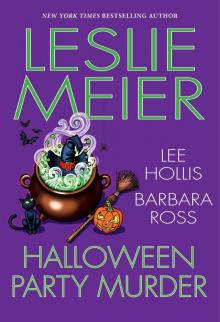 Halloween Party Murder
Halloween Party Murder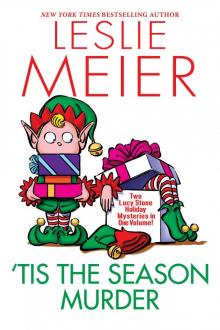 'Tis the Season Murder
'Tis the Season Murder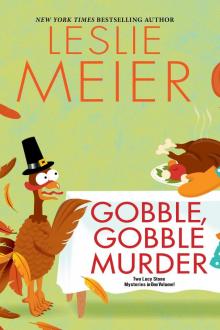 Gobble, Gobble Murder
Gobble, Gobble Murder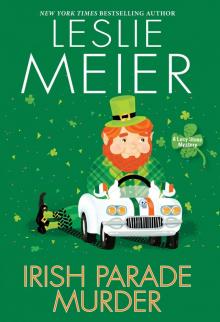 Irish Parade Murder
Irish Parade Murder Bake Sale Murder
Bake Sale Murder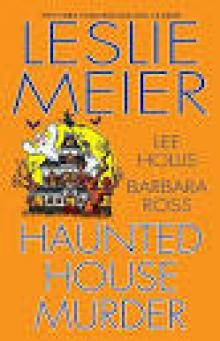 Haunted House Murder
Haunted House Murder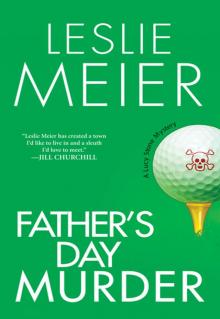 Father’s Day Murder
Father’s Day Murder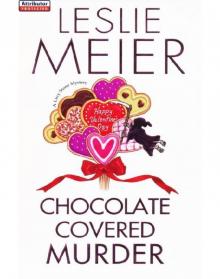 Chocolate Covered Murder
Chocolate Covered Murder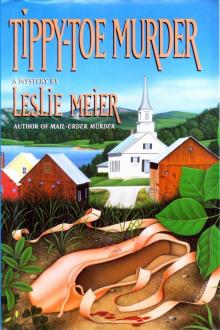 Tippy Toe Murder
Tippy Toe Murder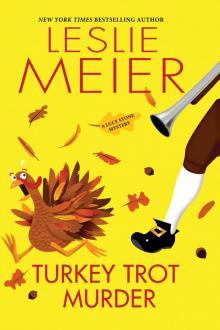 Turkey Trot Murder
Turkey Trot Murder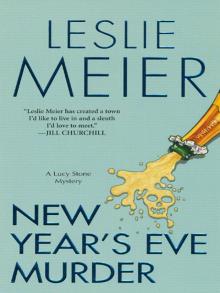 New Year's Eve Murder
New Year's Eve Murder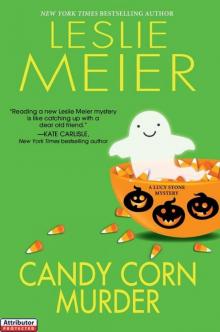 Candy Corn Murder
Candy Corn Murder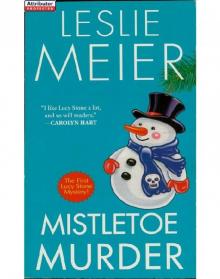 Mistletoe Murder
Mistletoe Murder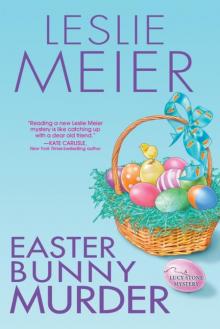 LStone 20 - Easter Bunny Murder
LStone 20 - Easter Bunny Murder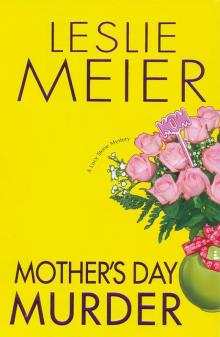 Mother's Day Murder
Mother's Day Murder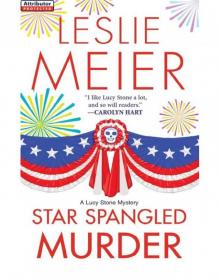 Star Spangled Murder
Star Spangled Murder Silver Anniversary Murder
Silver Anniversary Murder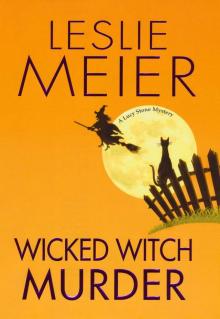 Wicked Witch Murder
Wicked Witch Murder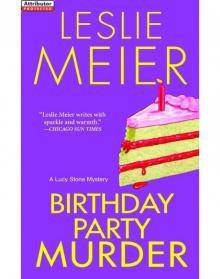 Birthday Party Murder
Birthday Party Murder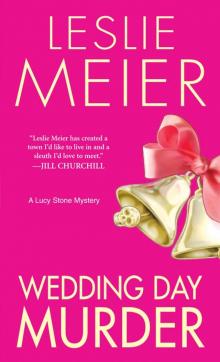 Wedding Day Murder
Wedding Day Murder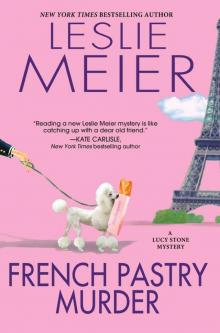 French Pastry Murder
French Pastry Murder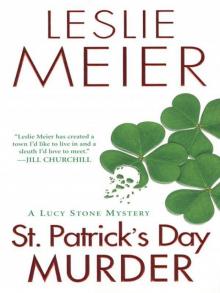 St. Patrick's Day Murder
St. Patrick's Day Murder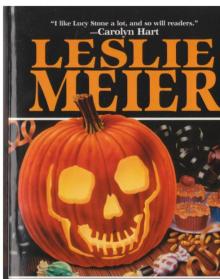 Trick or Treat Murder
Trick or Treat Murder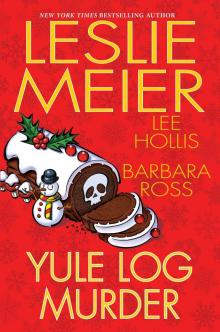 Yule Log Murder
Yule Log Murder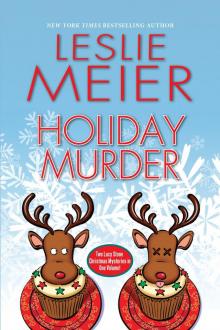 Holiday Murder
Holiday Murder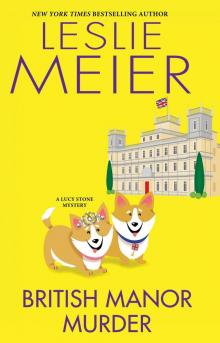 British Manor Murder
British Manor Murder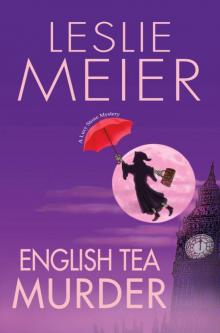 English Tea Murder
English Tea Murder